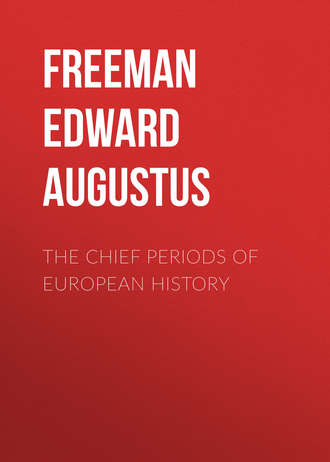
Freeman Edward Augustus
The Chief Periods of European History
The precepts of Plutarch are perfectly general. He draws no distinction between the different classes of cities, according to the greater or less degree of independence which they still formally kept. For in truth they were all practically in the same case; all had, in his own phrase, the shoe of the Roman over their heads.[18] The provincial town could act freely in many things, if the governor did not choose to meddle; the independent ally could not act freely in any thing, if the governor did choose to meddle. We find things on the whole the same when we turn from the philosopher giving wise precepts in his study to the orator actually haranguing the assemblies whose duties Plutarch so carefully lays down. Diôn Chrysostom is a rhetorician by profession, and he has the faults of his profession; but there is much that is attractive about the man and his writings, and he gives us several instructive pictures of Greek life in his own day. His orations on subjects of theoretical politics, on kingship, aristocracy, democracy, and the like, sound a little unpractical under the universal rule of Rome; but we must remember that it mattered a good deal whether the reigning prince was Domitian or Trajan. We gain real additions to our knowledge from the picture of the Euboian hunter, possessed of the civic franchise but who had never been in the city, and we learn better what an Euboian city was like in Diôn’s day.[19] More interesting still is his picture of the Greek city of Olbia or Borysthenês, still clinging to its Greek speech and manners amid the constant attacks of dangerous barbarian neighbours.[20] Of more importance for our purpose is his oration to the Rhodians, an oration of good advice, but of course largely mingled with panegyric on his hearers and their city. This is a document of deep interest, if read by the light of the history of that illustrious island in the second century before Christ. Rhodes is throughout addressed as a free commonwealth, as a democracy;[21] it is the one Greek state besides Athens which keeps its freedom;[22] it is the only one which still cherishes the glory of the Hellenic name.[23] The relations of the state to Rome are nowhere dwelled upon after the manner of Plutarch; Emperors are several times casually mentioned, but not as masters;[24] the point of connexion between Rhodes and Rome of which the orator is most inclined to speak is the part played by the Rhodians in the Roman civil war.[25] He knows of no break between the mighty Rhodes of an earlier day and the still flourishing democracy which he harangues. Some of his sayings could hardly have been approved by Plutarch; they are too much in the Marathôn and Eurymedôn style; but they could not, even as flourishes, have been addressed to a people who were not free, at least in theory, however precarious might be the tenure by which their freedom was held.
Less interesting in themselves than any of these, but perhaps in a certain way more instructive, are the speeches which Diôn makes in his own city of Prusa and in other towns of his native province. He had to preach peace and concord both to rival cities and to rival parties in the same city, and also to plead his own cause against his own enemies.[26] The assemblies which he addresses are always assumed to be self-acting bodies; references to the existence of Rome come in only casually, and Diôn does not often copy the plain-speaking of Plutarch.[27] But the speeches of the Greek orator put on a tenfold interest when we come to compare them with the memorable correspondence which is luckily preserved to us between a Roman Emperor and a proconsul of Bithynia in Diôn’s own day. The letters which passed between Trajan and Pliny seem at first sight to describe a wholly different state of things from that which appears in the speeches of Diôn. If we compare the two, we shall see that they set before us two opposite sides of the same state of things. From the two together we shall get a clear notion of the state of the various cities of Bithynia, and of the different relations in which, like those of any other province, they stood to the ruling power. Speeches and letters together illustrate the show of freedom which existed in perhaps every case, the reality of freedom which existed in some cases, and at the same time the precarious tenure by which both the shadow and the reality were held. We see the ordinary provincial town, still keeping the style of “res publica,” passing “psephismata,” sending “legati” to the Emperor and the neighbouring governors, playing in short at being a commonwealth, but not venturing to do any local act of the least importance without consulting the Emperor’s representative. Diôn brings out one side, Trajan and Pliny bring out the other side; that is all. Diôn makes a speech to the people of Nikomêdeia, exhorting them to peace and harmony with the people of Nikaia. Many passages would have been in place in the mouth of a mediator between Athens and Sparta five hundred years earlier. There is no direct mention of any superior authority as bearing rule over both; the orator indeed tells his hearers that after all they cannot make war on their enemies,[28] and warns them lest by their dissensions they make the Greek name ridiculous among the Romans.[29] We are for the moment amazed when we turn from this picture of two seemingly independent commonwealths to the letters which show how the Emperor and his representative had to be consulted by Nikomêdeia, Nikaia, and every other city, about the smallest municipal regulations, about every kind of local improvement.[30] It is an odd comment on the dissensions between city and city of which Diôn speaks, when Trajan, remembering how Nikomêdeia and other cities had been torn by seditions, will not allow the creation of a company of firemen, lest it be turned to some dangerous political purpose.[31] We again feel sure that Pliny, in his zeal, meddled in many matters which a worse proconsul would have left alone, and that, in his desire to do right, he referred many things to the Emperor which such a proconsul would have settled for himself in a high-handed way. Reading speeches and letters together, we better understand both. We are dealing with commonwealths, but with commonwealths acting in fetters. They do everything for themselves by votes of their own assemblies. But those votes need a licence beforehand, a confirmation afterwards, or both the one and the other, from the overruling power that stands without.[32]
Both Nikomêdeia and Nikaia, and Diôn’s own city of Prusa, were only ordinary provincial towns with no special privilege. But there were spots in Bithynia which were more highly favoured. Here, as elsewhere, the Roman colony, the free and allied city, were locally in the province, but not of it. It is plain that even cities of this rank were used to a good deal of meddling on the part of the Roman officers; but they resented such treatment and appealed to their privileges. Apameia was no provincial town, but a Roman colony. Diôn, who claimed to be one of its citizens, made a speech before its senate, in which he sets forth the dignity of its colonial character.[33] Pliny, more busy than other proconsuls, claimed to look over the accounts of the colony. The colonists told him that he was welcome to do so, that it was their common wish that he should do so. But he should remember that it was a thing which no proconsul had ever asked before; their ancient privileges gave them the right of managing their own commonwealth as they thought good. Pliny asks for and receives a statement of their case in writing. He thinks much of the paper irrelevant; but he sends it to the Emperor to be guided by his judgement. In all this correspondence one somehow thinks of the correspondence of Augustine and Gregory; the superior is so clearly the wiser man of the two. Trajan writes back that the straightforward dealing of the men of Apameia is to be respected; the proconsul is to tell them that it is by the Emperor’s special request that he asks to look at their accounts; he is to do so without any prejudice to their privileges for the future.[34] We here see plainly enough the difference inherent in the position of a Roman colony as distinguished from that of an ordinary town of the province. Still an Emperor and a proconsul less scrupulous than Trajan and Pliny might have made short work of the liberties of Apameia. Under the men with whom the colonists had actually to deal, those liberties, when once established by sufficient evidence, were safe.
But within the geographical limits of Bithynia there was something yet higher than a Roman colony. Amisos was an independent state surrounded by Roman territory. The city had in past times seen many settlers and many masters; it was at last delivered from its oppressors by Augustus Cæsar, and it became a free ally of Rome, bound to Rome only by the terms of its treaty.[35] We know not what those terms were; they may, like treaties with Gades and Aitôlia, have formally bound Amisos to respect the majesty of Rome, or they may not. That difference mattered little to a commonwealth whose geographical position compelled it in any case practically to respect that majesty. But it mattered greatly that, within its own walls, Amisos was by right perfectly free, governed by its own laws, which might or might not agree with the laws of Rome. Still it is plain that its treaty rights could not always secure the commonwealth from the meddling of Roman proconsuls. And it again marks the difference between the servant and the master that Pliny speaks of the liberties of Amisos as existing by the indulgence of Trajan, while Trajan himself grounds them directly on the faith of treaties. The proconsul asks if an eranos, a benefit club, is to be allowed in Amisos. Such a question marks the way in which the rights even of a perfectly free city were liable to be interfered with. Trajan, as we have seen in the case of the Nikomêdeian firemen, had a great dislike to unions and societies of any kind which might possibly be turned to political ends. No eranos is to be allowed in any city that is subject to the laws of Rome. But at Amisos, a city ruled by its own laws, Pliny is not to interfere with the establishment of such a body. The way in which the great Emperor speaks is remarkable. The might of Cæsar stands disarmed before the majesty of treaties. Trajan carries out a certain policy wherever he has the legal right to do so; where he has no such right, he forbears. Yet his words seem to imply that even he, the just Emperor, might have interfered with the rights of the free commonwealth, had he seen really good cause for doing so.[36] What other Emperors and other proconsuls did, with or without cause, it is easy to guess.
It is not at all wonderful if most of the business done by the assemblies of these commonwealths had to do with religious and social matters, and again with formal and trifling matters, with votes of honours, statues, and the like. As Diôn several times tells them implicitly, as Plutarch tells them more directly, the decision of greater matters had passed into other hands. The point is that these cities still kept the form of commonwealths, commonwealths that must have passed most of their lives in fear and trembling, but still commonwealths, even if in fetters, not mere municipalities, such as we are used to in our own day. In Eastern Europe and Western Asia this state of things is the direct and necessary consequence of the events of the Polybian age. The history of the Roman power in Western Europe is a wholly distinct subject. There Rome did not enslave or destroy, but created. The towns of the West looked forward, while the Greek commonwealths looked backward. The gradual extinction of these last was the necessary consequence of later changes, of changes which followed on the centralizing and despotic tendencies of the later Empire. Much of local independence had vanished between Strabo’s day and Pliny’s; the Lykian League itself was a thing of the past when Trajan respected the privileges of Amisos. How late any traces of freedom lingered we need not here inquire. My present object is to show the long abiding effects of the peculiar process by which the Roman dominion was definitely formed in that great determining period of the world’s history which is marked by the second century before Christ.







